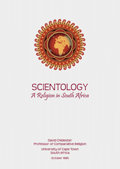All religions develop ethical rules, ethical standards, and ethical values that guide conduct in the everyday, ordinary situations and circumstances of personal and social life. The Church of Scientology also has a system of religious ethics. Guidelines for conduct have been formulated in a set of ethical codes: The Code of a Scientologist outlines basic principles of moral behaviour; the Auditor’s Code provides an ethical guide for pastoral practice that governs the conduct of Scientology ministers; and the Code of Honour sets out ethical ideals to which all Scientologists can aspire. Not only governing personal behaviour, these codes are regarded as the basis for a social transformation that promises a world without insanity, criminality, or war.
Underlying these ethical codes, however, is a distinctive approach to religious ethics in which ethical conduct is regarded as an integral part of spiritual growth. Ethical behaviour is seen as a direct result of advancement on the bridge to spiritual liberation. In this respect, therefore, ethics is intimately related to all the religious beliefs and ritual practices of the Church of Scientology.
Assuming that human beings are inherently good, Scientologists also recognize that they are capable of evil. The evil acts that human beings perform, however, are regarded as aberrations of the intrinsic goodness of human nature. From this perspective, the central ethical imperative of Scientology is to correct ethical aberrations and recover the original goodness of the human spirit. Essentially, religious ethics becomes a matter of restoring a primordial condition of ethical harmony.
Assuming that human beings are inherently good, Scientologists also recognize that they are capable of evil. The evil acts that human beings perform, however, are regarded as aberrations of the intrinsic goodness of human nature. From this perspective, the central ethical imperative of Scientology is to correct ethical aberrations and recover the original goodness of the human spirit.
In the history of religions, systems of religious ethics have not merely addressed specific actions. They have not merely prohibited some actions, such as lying, theft, or murder, and prescribed others. Rather, religious ethics has addressed what might be called dispositions of desire. In the Christian tradition, for example, medieval theologians formulated a standard list of the Seven Deadly Sins—pride, anger, lust, sloth, greed, gluttony, and envy. These sins, however, were not specific actions; they were dispositions of desire that directed human beings away from God. As the Italian poet Dante Alighieri declared in his Divine Comedy, these sins were seven different forms of the same “misdirected love.”24 According to Dante, misdirected desire alienated human beings from the divine love that orchestrated the celestial harmony of the heavenly spheres. Religious ethics, therefore, ultimately depended upon transforming spiritual dissonance into spiritual harmony.
Similarly, Buddhist ethics has identified the Three Deadly Sins—the emotions of lust, greed, and anger—that can also be understood as forms of desire. In this case, misdirected desire is not in harmony with the purity and freedom of Buddha nature. Therefore, both Christian and Buddhist traditions have understood religious ethics as a matter of bringing human desires into harmony with a spiritual ideal.25
Scientology ethics is based on a similar analysis of the relation between dissonance and harmony in human dispositions of desire. This ethical analysis is most clearly formulated in the Tone Scale. On a scale from zero to forty, the Tone Scale charts the spiritual dispositions from which different qualities of action flow. At the bottom of the scale, very low dispositions of desire—apathy, despair—are so close to death that they provide no basis for ethical action. Slightly higher, dispositions such as fear, anger, and hostility inhibit the freedom necessary for living an ethical life. In the next range, progress up the scale is evident in moving from conservatism, through strong interest in life, to a state of cheerfulness. Ethical conduct now becomes possible. But the scope for ethical action increases exponentially as the scale moves up through dispositions of enthusiasm, aesthetic participation, and exhilaration to arrive at the higher levels that represent the source of all action and the supreme Serenity of Beingness.
The Tone Scale, therefore, presents terms for assessing the relative dissonance or harmony of human dispositions of desire with the spiritual ideals of Scientology. As L. Ron Hubbard put it, “Descending down the Tone Scale, greater and greater dissonance could be considered to be introduced into theta. …” “As a musical analogy, one could say that the note was becoming less and less a pure and harmonious vibration and was becoming more and more off-key from itself.”26 In the religious ethics of Scientology, therefore, ethical action depends upon restoring the human spirit to its original condition of spiritual harmony.





























